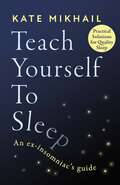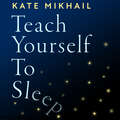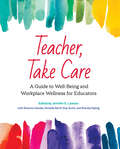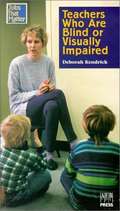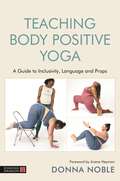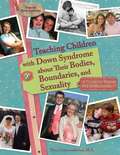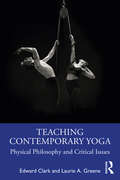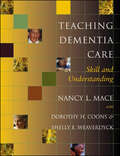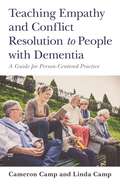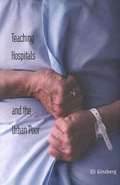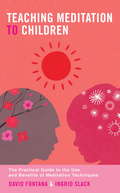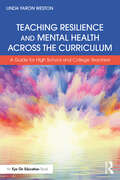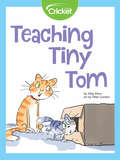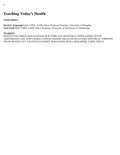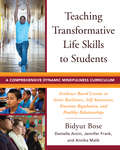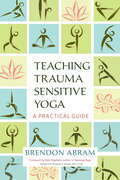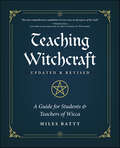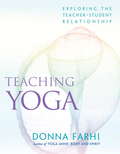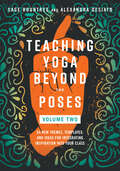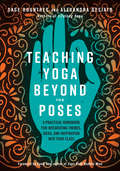- Table View
- List View
Teach Yourself to Sleep: An ex-insomniac's guide
by Kate MikhailAre you suffering from chronic insomnia, an erratic sleep pattern or do you simply feel that your sleep isn't as deep and restorative as it should be? Then struggle no more. Teach Yourself to Sleep is the new, sustainable solution that you have been waiting for.After decades of trying traditional methods to cure her poor sleep, the chance reading of a book by her great-great uncle, a pioneer in cognitive therapy and clinical hypnosis, led chronic insomniac Kate Mikhail to research the science of sleep and the mind-body loop, and develop the tried-and-tested methods that have finally enabled her to take control of her sleep and wake up feeling rested and energised.In Teach Yourself to Sleep, Kate shares her approach, blending first-person experience with accessible sleep science and interviews with leading doctors, scientists and academics, as well as highly effective sleep 'scripts' provided exclusively for this book by sleep experts.Teach Yourself to Sleep will help you to view sleep in a wider, deeper context by revealing that its quality is inseparably woven into the way you spend your day - not an add-on that comes out of nowhere as night descends. Considering sleep from every angle - from the role of biology-based self-talk in reinforcing better sleep habits, to fixing your sleep-wake cycle through the right balance of light and darkness, and when, what and how to eat for the best sleep possible - this book will help you to understand your sleep better and give you the tools to take control and finally begin to get the sleep you need.
Teach Yourself to Sleep: An ex-insomniac's guide
by Kate MikhailPRACTICAL SOLUTIONS FOR QUALITY SLEEP'In her brilliant new book Mikhail delivers accessible science to help you take back control of your bedtime and your sleep' PsychologiesAre you suffering from chronic insomnia, an erratic sleep pattern or do you simply feel that your sleep isn't as deep and restorative as it should be? Then struggle no more. Teach Yourself to Sleep is the new, sustainable solution that you have been waiting for.After decades of trying traditional methods to cure her poor sleep, the chance reading of a book by her great-great uncle, a pioneer in cognitive therapy and clinical hypnosis, led chronic insomniac Kate Mikhail to research the science of sleep and the mind-body loop, and develop the tried-and-tested methods that have finally enabled her to take control of her sleep and wake up feeling rested and energised.In Teach Yourself to Sleep, Kate shares her approach, blending first-person experience with accessible sleep science and interviews with leading doctors, scientists and academics, as well as highly effective sleep 'scripts' provided exclusively for this book by sleep experts.Teach Yourself to Sleep will help you to view sleep in a wider, deeper context by revealing that its quality is inseparably woven into the way you spend your day - not an add-on that comes out of nowhere as night descends. Considering sleep from every angle - from the role of biology-based self-talk in reinforcing better sleep habits, to fixing your sleep-wake cycle through the right balance of light and darkness, and when, what and how to eat for the best sleep possible - this book will help you to understand your sleep better and give you the tools to take control and finally begin to get the sleep you need.
Teach Yourself to Sleep: An ex-insomniac's guide
by Kate MikhailPRACTICAL SOLUTIONS FOR QUALITY SLEEP'In her brilliant new book Mikhail delivers accessible science to help you take back control of your bedtime and your sleep' PsychologiesAre you suffering from chronic insomnia, an erratic sleep pattern or do you simply feel that your sleep isn't as deep and restorative as it should be? Then struggle no more. Teach Yourself to Sleep is the new, sustainable solution that you have been waiting for.After decades of trying traditional methods to cure her poor sleep, the chance reading of a book by her great-great uncle, a pioneer in cognitive therapy and clinical hypnosis, led chronic insomniac Kate Mikhail to research the science of sleep and the mind-body loop, and develop the tried-and-tested methods that have finally enabled her to take control of her sleep and wake up feeling rested and energised.In Teach Yourself to Sleep, Kate shares her approach, blending first-person experience with accessible sleep science and interviews with leading doctors, scientists and academics, as well as highly effective sleep 'scripts' provided exclusively for this book by sleep experts.Teach Yourself to Sleep will help you to view sleep in a wider, deeper context by revealing that its quality is inseparably woven into the way you spend your day - not an add-on that comes out of nowhere as night descends. Considering sleep from every angle - from the role of biology-based self-talk in reinforcing better sleep habits, to fixing your sleep-wake cycle through the right balance of light and darkness, and when, what and how to eat for the best sleep possible - this book will help you to understand your sleep better and give you the tools to take control and finally begin to get the sleep you need.
Teacher, Take Care: A Guide to Well-Being and Workplace Wellness for Educators
by Megan Hunter Keith Macpherson Cher Brasok Monika Cichosz Rosney Laura Doney Dana Fulwiler Volk Jackie Gagné Kelsey McDonald Lisa Dumas Neufeld Sandra Pacheco Melo Richelle North Scott Joyce SunadaTeaching can be a highly satisfying profession, but it can also be overwhelming. Stress management. Self-care. Mental well-being. Mindfulness. These words have become all too familiar, but what do they actually mean for you? And how can they help without adding to your to-do list?All teachers have different experiences and different needs. Through stories by diverse educators, this professional resource invites you to try different wellness strategies, explore varying perspectives, and consider new ideas of what it means to &“be well.&”Grounded in servant leadership and a holistic model, each chapter connects to Indigenous perspectives of wellness through remarks from Elder Stanley Kipling and Knowledge Keeper Richelle North Star Scott.
Teacher, Take Care: A Guide to Well-Being and Workplace Wellness for Educators
by Megan Hunter Keith Macpherson Cher Brasok Monika Cichosz Rosney Laura Doney Dana Fulwiler Volk Jackie Gagné Kelsey McDonald Lisa Dumas Neufeld Sandra Pacheco Melo Richelle North Scott Joyce SunadaTeaching can be a highly satisfying profession, but it can also be overwhelming. Stress management. Self-care. Mental well-being. Mindfulness. These words have become all too familiar, but what do they actually mean for you? And how can they help without adding to your to-do list?All teachers have different experiences and different needs. Through stories by diverse educators, this professional resource invites you to try different wellness strategies, explore varying perspectives, and consider new ideas of what it means to &“be well.&”Grounded in servant leadership and a holistic model, each chapter connects to Indigenous perspectives of wellness through remarks from Elder Stanley Kipling and Knowledge Keeper Richelle North Star Scott.
Teachers Who Are Blind or Visually Impaired
by Deborah KendrickThe first volume in the Jobs That Matter series, Teachers Who Are Blind or Visually Impaired profiles 18 visually impaired individuals who have successfully fulfilled their dreams of becoming teachers. Included in this volume are educators of different ages, ethnic backgrounds, and geographic locations across the United States, who work in the classroom in ways that are both surprisingly similar and dramatically different from one another. These engaging individuals demonstrate how visually impaired teachers can be effective in their jobs and achieve classroom success and satisfaction. Designed to inspire young people who are blind or visually impaired, their families, and the professionals who work with them about careers that are available, the books in the Jobs That Matter series are meant to expand readers' horizons by showing a wide range of employment possibilities.
Teaching Body Positive Yoga: A Guide to Inclusivity, Language and Props
by Donna NobleDrawing on the philosophy and history of the body positivity movement, Donna Noble presents a radical re-examination of teaching inclusive yoga classes by breaking down stereotypes and demystifying yoga.By sharing accessible tools for everything from marketing a body-positive class to setting the scene in the space, using appropriate language and considering consent and touch, Noble demonstrates why every body is a yoga body - no matter what shape or size. With guidance on modifying poses for larger bodies, as well as chair-based sequences, this resource helps yoga teachers to ensure that the benefits of yoga are available to everyone.With practical tips, as well as information on social justice and body-positive yoga off the mat, Teaching Body Positive Yoga is a well-rounded resource that gives yoga teachers the confidence to host inclusive and welcoming classes for all.
Teaching Children with Down Syndrome about Their Bodies, Boundaries, and Sexuality: A Guide for Parents and Professionals
by Terri CouwenhovenParents of children with Down syndrome and other intellectual disabilties are accustomed to paying close attention to their child's physical, cognitive, and emotional development. This proactive approach should also include their child's sexual development, which for many parents may not seem as obvious or urgent, especially to those with young children. Drawing on her unique background as both a sexual educator and mother of a child with Down syndrome, the author blends factual information and practical ideas for teaching children with Down syndrome about their bodies, puberty, and sexuality. This book gives parents the confidence to speak comfortably about these sometimes difficult subjects. In an easy-to-read, non-clinical style, the book covers relevant issues and concerns for children of all ages, such as: labelling & explaining private body parts; Identifying & expressing emotions; Respecting personal space; Teaching self-care & hygiene; Understanding norms of privacy; Understanding gender identity; Showing appropriate levels of affection. It also covers issues that affect teenagers and young adults, including: Anticipating and understanding puberty; Dealing with periods, bras; Experiencing erections, wet dreams; Relating to the opposite sex; Sharing parental values about sexuality; Explaining sexual relationships; Preventing sexual abuse; Understanding how Down syndrome affects puberty & fertility rates. Each chapter highlights important points with key messages, teaching activities, parental pauses, and anecdotes, all of which prompt readers to stop and consider concepts or values associated with a particular topic. The final chapter covers the special concerns of parents who are now teaching teenaged or adult children about sexuality for the first time. It concludes with extensive appendices containing invaluable teaching materials and illustrations of body parts and functions.
Teaching Contemporary Yoga: Physical Philosophy and Critical Issues
by Edward Clark Laurie A. GreeneTeaching Contemporary Yoga provides a novel look at how modern yoga is understood, practiced, and taught globally. Utilising perspectives from several academic disciplines, the authors offer an analysis of the current state of modern yoga and the possibilities for future experimentation and innovation. The authors draw on anthropological, performance, and embodiment theories to understand yoga practice as a potentially powerful ritual of transformation as well as a cultural product steeped in the process of meaning making. They craft a unique analysis that contrasts asana with the largely unexamined philosophy underlying the practice of vinyasa, while imagining a vibrant future for the evolution of yoga through excellence in teaching. Unlike other writings about yoga, the authors offer a critique of the current practice of yoga as both diminished and utilitarian, while providing a path to reinvigorating the discipline based on current scientific knowledge and methods for teaching and practice. Along with these theoretical perspectives and the analysis of contemporary yoga in the West, the authors offer practical applications to address the challenges of teaching yoga in a society where individualism and materialism are core values. Open-ended exercises in reflection and experimentation offer opportunities for readers to apply what they have learned to their teaching and personal practice. This is a vital guide for any yoga-oriented scholar, teacher, or practitioner and is an essential companion for contemporary teacher training.
Teaching Dementia Care: Skill and Understanding
by Nancy L. MaceDementia afflicts millions of Americans and deeply affects the lives of their loved ones. Good care has been proven to have a significant effect on the quality of life of a person with dementia. To ensure good care, staff members of nursing homes, assisted living facilities, and adult day-care centers, and providers of home care must be thoroughly and continually trained by qualified and well-prepared professionals.Nancy L. Mace, coauthor of The 36-Hour Day, has created the ultimate teachers' guide for dementia care training. Rich with information and with tools for effective communication between teacher and student, the text supplies instructors with in-depth lessons and includes relevant charts, tables, and handouts, which may be customized to suit specific programs. Good training is the foundation for a confident and competent caregiver and supports the dignity and well-being of persons with dementia and their families. With her unmistakable compassion, humor, and wisdom, Mace has provided a much-needed guidebook for better teaching and better care.
Teaching Empathy and Conflict Resolution to People with Dementia: A Guide for Person-Centered Practice
by Cameron Camp Linda CampThe way in which dementia is understood and treated is changing, with a growing focus on the individual's experience and person-centred approaches to care. Introducing a new model of dementia care that reflects on the role of a person with dementia within a community and their relationships, this guide for professional and family caregivers demonstrates how to facilitate positive relationships for peaceful living. By understanding the cognitive and physical challenges that older adults with dementia face, caregivers can practice empathic care that affords people with dementia increased freedom of expression and independence. Included here are techniques for conflict resolution that enable people with dementia to be active and self-initiating in times of distress and disruption. Looking at the basics of respect, empathy, and mindfulness, this book also provides hands-on training for employing these virtues in practice with a number of exercises to help achieve the goal of peaceful independent living.
Teaching Hospitals and the Urban Poor
by Eli GinzbergAcademic health centers (AHCs) have played a key role in propelling the United States to world leadership in technological advances in medicine. At the same time, however, many of these urban-based hospitals have largely ignored the medical care of their poor neighbors. Now one of the leading experts in American health policy and economics ponders whether current and proposed changes in the financing and delivery of medical care will result in a realignment between AHCs and the poor. Basing his discussion on an analysis of the nation's twenty-five leading research-oriented health centers, Eli Ginzberg and his associates trace the history of AHCs in the twentieth century. He claims that AHCs are once again moving toward treating the poor because these hospitals need to admit more Medicaid patients to fill their empty beds, and their medical students need opportunities to practice in ambulatory sites. He also assesses some of the more important trends that may challenge the AHCs, including financial concerns, changing medical practice environments, and the likelihood of some form of universal health insurance.
Teaching Meditation To Children
by David Fontana Ingrid Slack"This book is for adults, and explains how to introduce children to meditation. The idea of teaching meditation to children is relatively new to the Western world, but in the East meditation has long been accepted as an essential part of early education, laying down skills which are of lifelong benefit. The book is intended for all adults who wish to teach meditation to children. That includes parents, school-teachers, youth leaders, social workers, psychologists, church workers, grandparents, uncles and aunts, and anyone who has contact with children in an official capacity and who wishes to help them make the best use of their extraordinary minds. This book is based upon our own experience as psychologists who have worked extensively with children, and who have written about and taught meditation to all age groups. Children are impressionable human beings, and very much open to direction and influence by adults. Thus any attempt to introduce them to meditation must be done sensitively and wisely (we have more to say about this in Chapter 2), and must empower them not only to meditate, but also to judge the usefulness of meditation for themselves. This ability to judge will allow them to decide whether or not meditation is right for them. Of all activities, meditation is perhaps the one where success most depends upon voluntary participation. In addition, as meditation involves working with one's own mind, children should be given the right to accept or reject it as they think fit. This book is intended to help you to introduce children to meditation easily and effectively, and in the right spirit."
Teaching Resilience and Mental Health Across the Curriculum: A Guide for High School and College Teachers
by Linda Yaron WestonWritten by a teacher for teachers, Teaching Resilience and Mental Health Across the Curriculum is an integrative approach to pedagogy for educators at the high school and college level to survive, thrive, and sustain in the profession. Blending theory, research, and practice for a comprehensive program for teachers to incorporate well-being tools into the classroom, each of the book’s five foundations includes engaging information, strategies, real-world examples, interactive reflection questions, and activities that can be directly applied to teaching and life. Practical guidance in designing real-world curriculum is offered alongside accessible strategies for engagement, investment, and active learning in student-centered classrooms. An essential guide for teachers, it includes techniques for incorporating well-being that are grounded in culturally responsive teaching, trauma-informed instruction, mental health, resilience, and emotional literacy. Teachers will also gain insight on how to make the career sustainable through practices for self-compassion and authentic self-care so they can not only survive, but flourish in and out of school. For all the challenges that students and teachers face, this book defines what it means, and what it takes, to teach in today’s classrooms.
Teaching Tiny Tom
by Meg MossTiny Tom the kitten learns all about felines and how they take care of themselves. In the process, he finds out about grooming, whiskers, litter boxes, and body language.
Teaching Today's Health
by David Anspaugh Gene EzellTeaching Today’s Health, Tenth Edition, balances comprehensive theory with a wealth of effective classroom activities to give you the tools you need to become successful health educators. This book’s strong background and depth in teaching methods prepares you for the challenges of today’s teaching environment. <p><p>Meaningful content enhancements include expanded coverage of bullying and obesity, body systems, and substance abuse and a new Creativity in the Classroom feature and an Index of Strategies). Important currency updates include a significantly updated nutrition chapter with new MyPlate and 2010 Dietary Guidelines and more technology coverage. Helpful Companion Website include all Worksheets available in PDF form, for easy copying to hand out to students in class, and a new easy-to-reference Glossary.
Teaching Transformative Life Skills to Students: A Comprehensive Dynamic Mindfulness Curriculum
by Annika Malik Bidyut Bose Danielle Ancin Jennifer FrankA classroom-ready program of evidence-based lessons in (1) stress resilience, (2) self-awareness, (3) emotion regulation, and (4) healthy relationships. Transform school and classroom climate, increase teacher sustainability, and build invaluable life skills in students with four ready-to-implement units incorporating mindful movement, yoga postures, breathing techniques, and more. The evidence-based and trauma-informed Transformative Life Skills (TLS) curriculum offers educators 48 scripted, 15-minute lessons designed to require minimal preparation and fit neatly within the busy school days of a single academic semester. Recommended by CASEL, it benefits all five core competencies of Social and Emotional Learning.
Teaching Trauma-Sensitive Yoga: A Practical Guide
by Mark Stephens Brendon Abram Margaret A. HowardA practical, hands-on, experienced-based guide from a military veteran turned yoga teacherBrendon Abram combines his first-hand experience with PTSD in the field and years of teaching to offer this practical guide to bringing trauma-sensitive yoga to both clinical and studio settings. Drawing on his work with military veterans, first responders, and survivors of domestic and sexual abuse, he emphasizes the importance of respecting the uniqueness of every individual and demonstrates how to use the foundational principles of yoga to create a safe experience. Abram explains that basic principles of yoga bring power to the practice and that breath, mindful movement, focused awareness, and acceptance of present-moment experience form the foundation of any yoga offering.
Teaching Witchcraft: A Guide for Students & Teachers of Wicca
by Miles BattyA Lost Underground Classic for Seekers and Instructors of the CraftTeaching Witchcraft is written for today's practitioners, both in coven groups and solitary study. Featuring more than thirty-five lessons that reflect current cultural perspectives and practices in the Wiccan community, this resource includes contemporary lesson guides and exam questions, as well as an emphasis on inclusivity.Miles Batty presents an extensive variety of topics, including spellcasting, ritual construction and procedures, the Wheel of the Year, the principles of Wiccan belief, and the four cornerstones of magick. You'll start with the fundamentals and progress through the Craft's many facets, from its history and tools to divination and etiquette. This step-by-step-guide also covers the faces of the goddess, sexuality in Witchcraft, correspondences, and magickal ethics. With lessons and study questions for every level of student, this is the essential resource for learning and teaching Witchcraft.
Teaching Yoga
by Donna FarhiDrawing on decades of experience in training Yoga teachers, Donna Farhi offers the first book to set professional standards for yoga teachers. Teaching Yoga explores with depth and compassion a variety of topics both practical and philosophical, including how to create healthy boundaries; the student-teacher relationship (including whether a sexual relationship is acceptable); how to create physical and emotional safety for the student; what is a reasonable class size; how much a class should cost; and how to conduct the business of teaching while upholding the integrity of Yoga as a philosophy, a science, and an art. A bonus CD features the author speaking about yoga ethics at a 2002 conference.
Teaching Yoga
by Donna FarhiDrawing on decades of experience in training Yoga teachers, Donna Farhi offers the first book to set professional standards for yoga teachers. Teaching Yoga explores with depth and compassion a variety of topics both practical and philosophical, including how to create healthy boundaries; the student-teacher relationship (including whether a sexual relationship is acceptable); how to create physical and emotional safety for the student; what is a reasonable class size; how much a class should cost; and how to conduct the business of teaching while upholding the integrity of Yoga as a philosophy, a science, and an art. A bonus CD features the author speaking about yoga ethics at a 2002 conference.
Teaching Yoga
by Donna FarhiDrawing on decades of experience in training Yoga teachers, Donna Farhi offers the first book to set professional standards for yoga teachers. Teaching Yoga explores with depth and compassion a variety of topics both practical and philosophical, including how to create healthy boundaries; the student-teacher relationship (including whether a sexual relationship is acceptable); how to create physical and emotional safety for the student; what is a reasonable class size; how much a class should cost; and how to conduct the business of teaching while upholding the integrity of Yoga as a philosophy, a science, and an art. A bonus CD features the author speaking about yoga ethics at a 2002 conference.
Teaching Yoga Beyond the Poses, Volume 2: 54 New Themes, Templates, and Ideas for Integrating Inspiration into Your Class
by Sage Rountree Alexandra DeSiatoVolume 2 of the bestselling guide for yoga teachers—design fresh, confident, and dynamic classes your students will love 54 inspired new themes: a full year of templates to engage, retain, and connect with your studentsThis companion volume—with all-new material—offers 54 ready-made ideas and templates to elevate your classes, refine your voice, and teach inspired themes with joy and confidence.Each chapter—like Rise to Joy, Less is More, and Rebel, Yogi!—introduces a series of updated themes. Authors Sage Rountree and Alexandra DeSiato offer practical upgrades to the bestselling first volume of Teaching Yoga Beyond the Poses, with new prompts, expanded notes, and thoughtful cues to help you connect with students and center their experiences in class. Each template offers useful guidance on:Expounding on your theme and connecting it to both personal and universal experiencesChants, quotes, mantras, poems, or songsSpecific practices that work with your themeDistilling your theme to a short sentence or intention for your classTakeaway ideas and helpful notesAny of the 54 class themes can be used as-is or molded to embody your own personal teaching style and authentic voice. Each includes insightful options for opening your class, suggestions for what to say during movements and pauses, and helpful ideas for closing out strong. Grounded in the knowledge that yoga philosophy is applicable to our daily lives—and its wisdom is for all of us—this book offers adaptable and easy-to-use ways to transform your classes, empower your students, and build richer, more meaningful connections by teaching beyond the poses and into the world.
Teaching Yoga Beyond the Poses: A Practical Workbook for Integrating Themes, Ideas, and Inspiration into Your Class
by Sage Rountree Alexandra DeSiatoCreate class themes with yoga philosophy, inspirational quotes, and simple concepts to inspire and motivate students Experienced yoga instructors Sage Rountree and Alexandra DeSiato give yoga teachers the tools to find their voice and tap into innate wisdom. The authors offer ready-made, detailed themes to use in classes and provide flexible templates for building a toolkit of themes for future use. Teaching Yoga Beyond the Posesoffers guidance for both new and experienced teachers starting with a section on voice, authenticity, emulation, phrasing, practice, repetition, and finding inspiration. It continues with a second section that contains fifty-four complete themes that instructors can easily use in their own classes. The final section includes blank templates for instructors to create their own class themes and notes. With a unique angle and practical feel, this workbook will appeal to yoga teachers, teacher trainers, and at-home practitioners who want to move to the next level.
Teaching Yoga for the Menstrual Cycle: An Ayurvedic Approach
by Anja Brierley LangeMenstrual cycle awareness is crucially important when trying to understand the needs of your yoga students and this guide will give you the knowledge you need to confidently address the menstrual cycle when teaching students in group and one-on-one settings via the principles of both western and Ayurvedic approaches. This book addresses the importance of the menstrual cycle and how Ayurvedic principles can best be applied to understand the anatomical, physiological and hormonal changes that take place during different stages and weeks throughout the menstrual cycle.Anja Brierley Lange highlights the purpose and importance of each phase of the menstrual cycle and how yoga teaching can and should be tailored accordingly to your students' menstrual needs.
